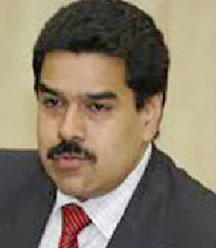CARACAS, (Reuters) – Even as Cuba and the United States try to bury 50 years of enmity, Venezuelan leader Nicolas Maduro has seemed to be going in the other direction, vilifying “insolent Yankees” at rallies and threatening to cut ties completely.
Fellow leftists Cuba and Venezuela are arguably the most unconditional allies in Latin America, but Cuban President Raul Castro’s move to rapprochement with the old “imperialist” enemy contrasts with Maduro’s fury at U.S. plans for sanctions against his own government.

“It looks like Raul is cheating on Nicolas!” scoffed Venezuelan opposition leader Henrique Capriles in an interview with Reuters. “All of the Americas going in one direction, and Nicolas doesn’t know where he’s heading.”
In a relationship borne from ex-presidents Fidel Castro and Hugo Chavez’s close friendship and ideological affinity, Cuba is reliant on OPEC member Venezuela for economic support – to the tune of around 90,000-100,000 barrels-per-day of subsidized oil.
So its decision to restore ties with Washington may be motivated in part by a desire to diversify away from Venezuela, given the increasingly parlous support of the South American nation’s economy and doubts over Maduro’s political future.
President Raul Castro’s government has been paying for some of the oil by sending more than 40,000 Cubans to Venezuela to work as medics, sports trainers, and – most controversially – military and intelligence advisers.
Though they are unlikely to admit it in public, both Maduro and Castro may in fact be relieved that an economic lifeline looking likely to come under strain, as Venezuela suffers recession and an oil price plunge, could become less crucial. Venezuela was already reducing its oil shipments to other allies in the Petrocaribe alliance. It will almost certainly continue to help Cuba but may be able to scale back, especially if Cuba can get oil from elsewhere.
The surprise announcement of the restoration in U.S.-Cuba ties came days after the U.S. House of Representatives and Senate passed legislation to deny visas and freeze assets of Venezuelan officials accused of repressing anti-Maduro protesters.
Obama plans to sign the legislation, the White House said.
That brought a thundering reaction from Maduro who said on Sunday he sometimes wondered whether to close the U.S. embassy in Caracas and end ties altogether, and on Monday led thousands of red-clad supporters in an anti-sanctions march.
“They can shove their U.S. visas where they should be shoved, insolent Yankees!” Maduro said in a speech reminiscent of his mentor Chavez’s 14-year rule.
The Venezuelan leader did, though, join the global chorus of praise for Obama’s long-promised reconciliation with Cuba.
“It’s a courageous and historically necessary step. It’s possibly the most important step of his presidency,” Maduro said on Wednesday at a regional summit in Parana, Argentina, notably ratcheting down his recent tone.
“We continue seeking the best ways for ties with the giant in the north to take the course they should, especially due to the news and fresh winds in the Caribbean, in Cuba,” added Maduro, seemingly taken by surprise like many others.
Also speaking at the Mercosur summit, Ricardo Patino, the foreign minister for Ecuador – another leftist member of the regional ALBA bloc – said he hoped the U.S-Cuba change would provoke a re-think over sanctions on Venezuela.
“President Obama’s decision delights us,” he told Reuters, adding it could create “confusion” given the opposite signal sent by the Venezuelan sanctions. “I hope the decisions Congress has asked President Obama to take now don’t go through.”
However Venezuelan-U.S. political ties proceed, pragmatism still seems to take precedence when it comes to business.
Venezuela remained the fourth biggest source of U.S. oil imports in 2013, supplying 797,000 barrels per day of crude oil and petroleum products, according to U.S. government data.




